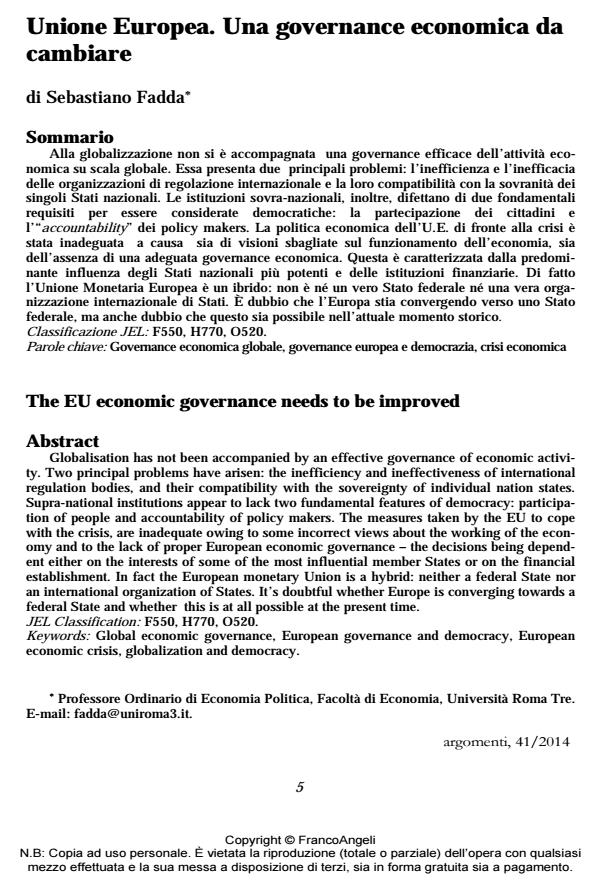The EU economic governance needs to be improved
Journal title ARGOMENTI
Author/s Sebastiano Fadda
Publishing Year 2014 Issue 2014/41
Language Italian Pages 17 P. 5-21 File size 90 KB
DOI 10.3280/ARG2014-041001
DOI is like a bar code for intellectual property: to have more infomation
click here
Below, you can see the article first page
If you want to buy this article in PDF format, you can do it, following the instructions to buy download credits

FrancoAngeli is member of Publishers International Linking Association, Inc (PILA), a not-for-profit association which run the CrossRef service enabling links to and from online scholarly content.
Globalisation has not been accompanied by an effective governance of economic activity. Two principal problems have arisen: the inefficiency and ineffectiveness of international regulation bodies, and their compatibility with the sovereignty of individual nation states. Supra-national institutions appear to lack two fundamental features of democracy: participation of people and accountability of policy makers. The measures taken by the EU to cope with the crisis, are inadequate owing to some incorrect views about the working of the economy and to the lack of proper European economic governance - the decisions being dependent either on the interests of some of the most influential member States or on the financial establishment. In fact the European monetary Union is a hybrid: neither a federal State nor an international organization of States. It’s doubtful whether Europe is converging towards a federal State and whether this is at all possible at the present time.
Keywords: Global economic governance, European governance and democracy, European economic crisis, globalization and democracy
Jel codes: F550, H770, O520.
- Caffè F. (1986). In Difesa del Welfare State. Rosenberg & Sellier, p.42.
- Castell M. (2000). End of Millennium. Oxford. Blackwell.
- Cooper R. (2003). The Breaking of Nations: Order and Chaos in the Twenty-first Century. Atlantic Books. London.
- Eatwell J. (2012). The Theory of Value and the Foundations of Economic Policy. Memoriam Pierangelo Garegnani, Roma Tre University, 24th February (mimeo).
- Eichengreen B. (2007). The Break-up of the Euro Area. NBER Working Paper, n. 13393.
- Jachtenfuchs M. (1997). Democracy and Governance in the European Union. European Integration online Papers (EIoP), n. 2.
- Smith G., Naìm M. (2000). Altered States. Globalization, Sovereignty and Governance. International Development Research Centre, Ottawa, p.XIV.
- Stiglitz, J. (2003). Globalization and the Economic Role of the State in the New Millennium. Industrial and Corporate Change, n. 1, pg. 3-26.
Sebastiano Fadda, Unione Europea. Una governance economica da cambiare in "ARGOMENTI" 41/2014, pp 5-21, DOI: 10.3280/ARG2014-041001